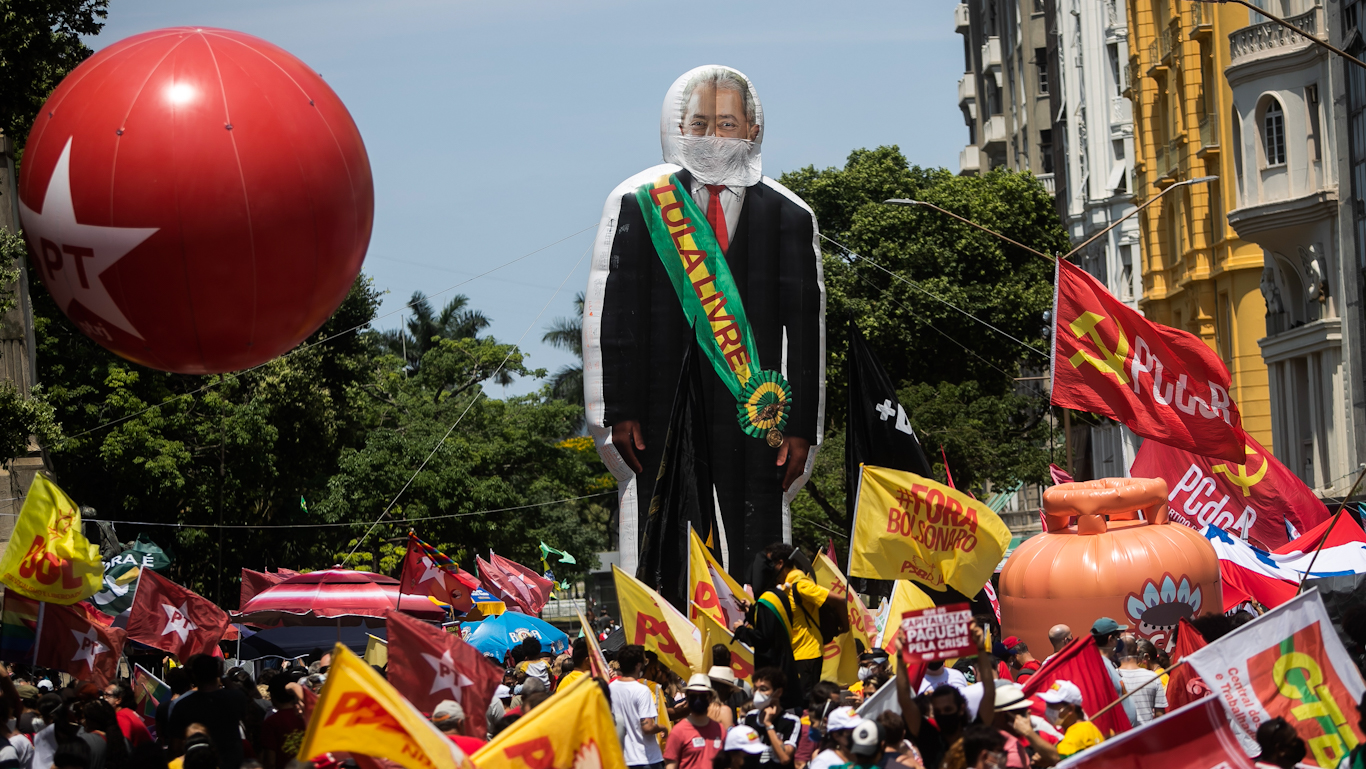RIO DE JANEIRO – Former Brazilian president, and frontrunner in the upcoming October 2022 presidential election, Luíz Inácio Lula da Silva is putting four of his one-time accusers of corruption and money laundering in the dock. The initial charges and inquiries — all 25 of them — were completely dismissed earlier this month.
Lula’s legal battles — including his sentence of 12 years and 11 months in prison, a sentence that was later increased to 17 years — are part of the infamous and multifaceted “Car Wash” investigations into corruption at state and private companies, such as Petrobras and Odebrecht, as well as among businessmen and politicians. In fact, it was during Lula’s administration that Brazil’s federal police were provided with the legal tools and mechanisms to initiate the Car Wash operations. As years went by, FBI agents operating from the U.S. Embassy in Brasilia became party to these investigations.
Four heading to the dock
Deltan Dallagnol, former head of the Car Wash Task Force in Curitiba, is accused by Lula’s legal team, headed by Cristiano Zanin Martins, of abuse of power. On September 14, 2016, via a PowePoint presentation during a press conference broadcast on national TV, Dallagnol accused the ex-president of corruption and being the ringleader of a criminal organization. Apart from providing no proof to support his claims, the PowePoint had grammatical errors and resembled a solar system with numerous corrupt planets rotating around an almighty corrupt sun named Lula. Brazil’s Supreme Court of Justice will preside over the case.
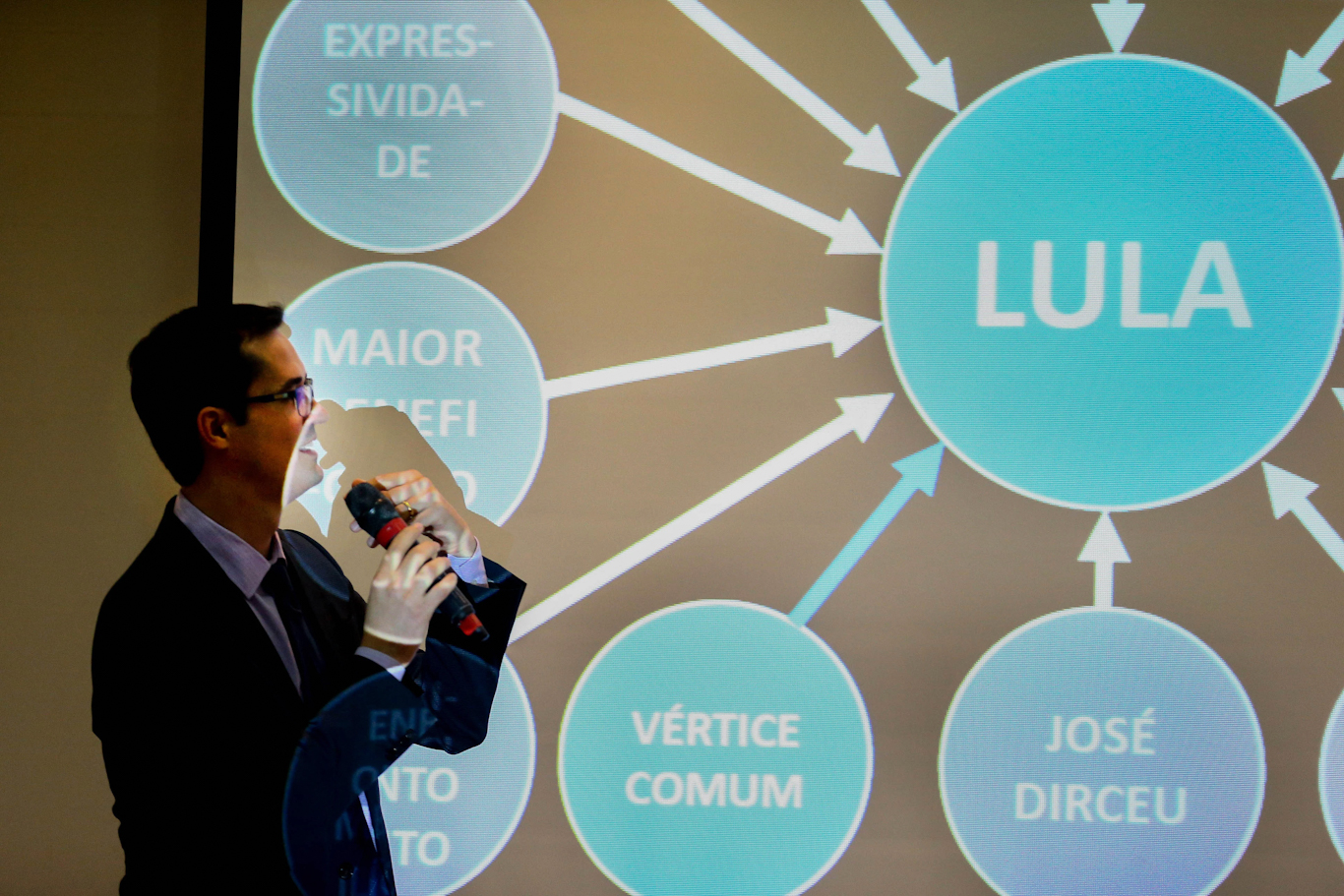
Deltan Dallagnol accuses former Lula da Silva of corruption and heading a criminal enterprise. Geraldo Bubniak | Estado
Delcídio do Amaral, a former senator from the state of Mato Grosso do Sul and employee of British multinational oil company Shell, is accused of falsely testifying during a plea bargain that Lula attempted to buy the silence of a Petrobras director involved in a corruption scandal.
Federal Police Deputy Filipe Pace is accused of causing moral damages to the former president. While interrogating former Chief of Staff and ex-Finance Minister Antonio Palocci, Pace claimed that the word “amigo” (friend), encountered on a spreadsheet, referred to Lula.
Finally, Lula accuses Congressman Eduardo Bolsonaro — son of Brazil’s current president, Jair Bolsonaro — of publishing false information about Lula’s late wife, Marisa Letícia. In 2020, Eduardo — as well as Brazil’s minister of culture, Regina Duarte — posted on their social media accounts that Letícia held personal investments totaling R$256 million (approximately $49 million USD at today’s exchange rate). After judicial review, it was discovered that Letícia’s total investments amounted to R$26,000.
The social media posts have “publicly tarnished the memory of Marisa Letícia Lula da Silva,” said the heirs of the former first lady, and are a “clear attempt to subvert the image of the deceased.”
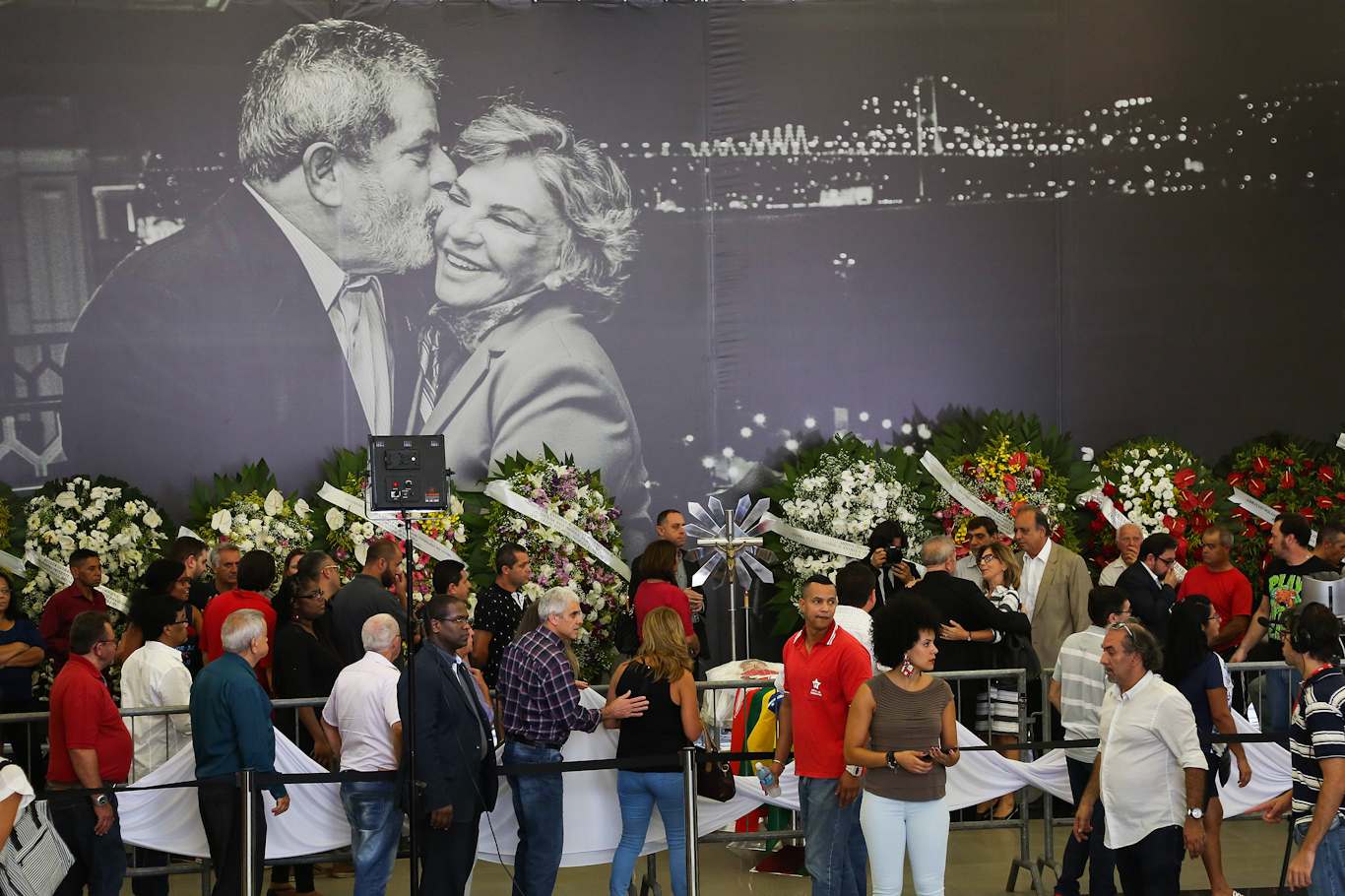
Supporters attend the wake of Marisa Leticia Lula da Silva in Sao Bernardo do Campo. Andre Penner | AP
Former Judge Sergio Moro escapes counter-charges
Not in the dock is Sergio Moro, the former federal judge who initially convicted Lula, the most popular president in Brazil’s history, to one month shy of 13 years in prison. The sentence was handed down by the 13th Federal Court of Curitiba (many simplified the name to “Moro’s Court”) in the state of Paraná.
In a document published by WikiLeaks, Moro’s name is listed as a participant in a conference titled Bridges Project held in Rio de Janeiro. Associated with the U.S. State Department, this project aimed to consolidate bilateral training between the United States and Brazil in order to apply the law. During the conference, Moro was called on to discuss 15 common issues involving money laundering cases in Brazilian courts.
Moro was seated as Brazil’s new minister of justice shortly after Jair Bolsonaro was sworn in as president in 2019. During his 16-month stint in office, he — along with the former director of Brazil’s federal police, Mauricio Valeixo — signed agreements with the FBI that increased the United States’ footprint on the Brazilian judicial system. This cooperation included support for a surveillance unit operating on the Triple Frontier, investigations into cooperation scandals, and access to biometric data of Brazilian citizens. The FBI office in Brazil requested more resources from the U.S. government to increase its number of agents from 10 to 30, in order to facilitate more cooperation requests.
FBI looms over Brazil
In 2004, Carlos Costa, former director of the FBI in Brazil, revealed that the bureau was operating in the South American giant. While testifying before the Public Prosecutor’s Office (MPF), he affirmed that the FBI financed and directed Brazilian Federal Police operations, which resulted in their “subordination to U.S. authorities.”
The year 2014 marked the beginning of the FBI’s cooperation with the Car Wash investigations, with its support increasing over the next two years. George “Ren” McEachern led the bureau’s International Corruption Squad, overseeing most of the investigations in the name of the U.S. DOJ. In a 2018 interview titled “Car Wash Operation Is an Example for the World,” McEachern stated, “What is occurring in Brazil is changing the way we see business and corruption all across the world,” adding specifically that “the courts in Curitiba sent out the message that Brazil is becoming clean.” While participating in an event hosted by the International Chamber of Commerce (ICC), McEachern underscored that Car Wash investigations could result in the loss of jobs; however, “in the long term, it generates a lot more sustainable businesses.”
During the Fourth Annual International Compliance Congress and Regulator Summit, hosted in São Paulo in May 2016 and attended by 90 members of São Paulo’s Federal Public Prosecutor’s Office, McEachern emphasized that the FBI was offering technical support to investigators in relation to “encryption, mobile telephones, and cloud data,” with a cybernetic analyst headquartered in Brasília.
FBI investigations in Brazil, as of August 2017, were overseen by David Brassanini, current head of the FBI in the country. Agents from the Bureau come to São Paulo “every week to address cases involving FCPA (Foreign Corrupt Practices Act) and money laundering,” said Brassanini during his presentation at the Seventh International Congress on Compliance, held in São Paulo in May 2019, adding: “Brazilian federal police agents have recently told me that even if they had no more additional information, nor conducted investigative work, they’ll still have material to conduct corruption and money laundering inquiries for the next five years.” The career FBI chief conducts his work from the U.S. Embassy in Brasilia, coordinating with colleagues in the U.S. embassies in São Paulo, Rio de Janeiro, Recife, Belo Horizonte, and Porto Alegre.
Brassanini described the cooperation between U.S. and Brazilian authorities as being “fluid, without problems, and transparent.… The ability to develop and understand local peculiarities is great, not only in regards to the language but to really understand how Brazil functions — comprehending the nuances.”
Lawfare precursor(s): Africa to South America?
The multifaceted legal case that culminated in Lula’s imprisonment comprises what is referred to as “lawfare,” a strategy employed to attack, undermine, weaken, and unseat political opponents through manipulative legal and judicial maneuvers. Lawfare, a seemingly more advanced version of political blackmail, has become an efficient tool targeting progressive leaders in the global south. Its use has precedent in Africa.
In a precursor to lawfare’s present-day iteration, former Liberian President Charles Taylor was found guilty of 11 counts of war crimes and crimes against humanity by the International Criminal Court (ICC) in April 2012. Sentenced to 50 years in HM Prison Frankland in Britain, he had become the first former head of state since the Nuremberg trials to be convicted by an international court.
Taylor’s offenses were alleged to have been committed in a neighboring state, Sierra Leone, during that country’s civil war. Many viewed the case as a corrupt, politically motivated ICC trial, especially considering that, unlike known dictators and despotic regimes of the past — Rhodesia’s Ian Smith, Portuguese colonialism, and Apartheid, to name a few — Taylor, adhering to a deal brokered by African leaders, voluntarily resigned as president on August 11, 2003, in pursuit of a peaceful resolution to a civil war in his country. “I have accepted this role as the sacrificial lamb,” Taylor said during his resignation speech.
Former U.S. President George W. Bush, in May 2001, signed an executive order (No. 13213) stating:
The government of Liberia’s complicity in the RUF (Revolutionary United Front) illicit trade in diamonds, and its other forms of support for the RUF are direct challenges to the United States foreign policy objectives in the region, as well as the rule-based international order that is critical to the peace and prosperity of the United States. Therefore, I find these actions by the government of Liberia contribute to the unusual and extraordinary threat to the foreign policy of the United States described in executive order 13194, with the respect to which the president has declared a national emergency.
Several former intelligence agents, headed by the first lead prosecutor, David Crane, a former U.S. defense intelligence official for 30 years, led the case against Taylor. This, despite the fact that the United States was not a signatory to the formation and function of the ICC, thus rendering its own military and political leaders exempt from any and all litigation.
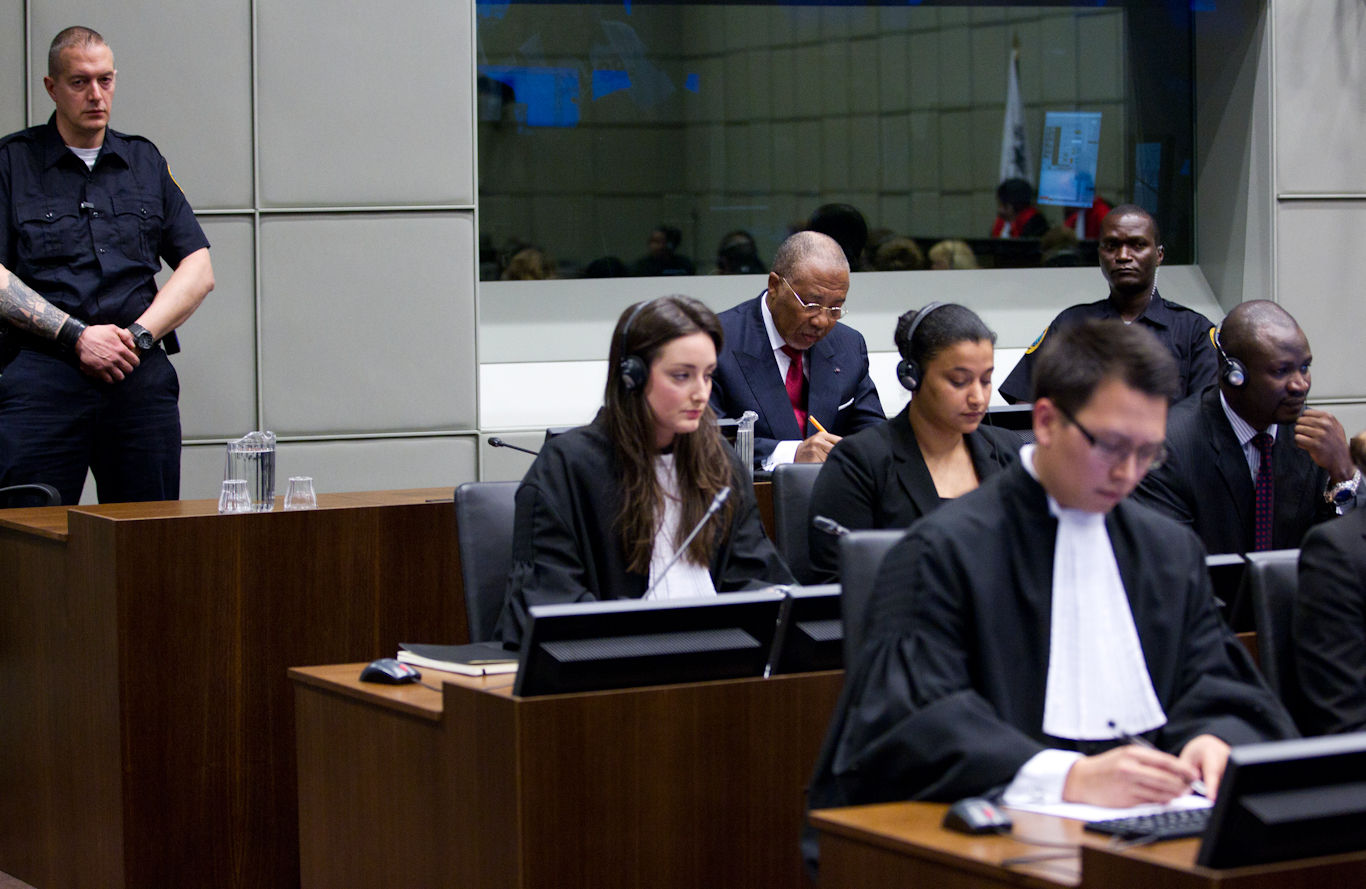
Charles Taylor, center rear, is flanked by security guards as he waits for the start of a hearing in The Hague, April 26, 2012. Peter Dejong | Pool | AP
Taylor’s defense team, headed by Dr. Courtenay Griffith QC, revealed that Crane unlawfully opened the court’s sealed indictment, revealing it to U.S. government officials at its embassy in Freetown. On February 8, 2006, in a footnote to a statement presented to a hearing presided over by the U.S. House Subcommittee on Africa, Crane noted that “the unsealing of the indictment against Charles Taylor on the day he arrived in Accra, Ghana for the peace talks in June of 2003 was a calculated move on my part… [M]y intent was to…humiliate him before his peers, the leaders of Africa, and to serve notice to Taylor and others that the days of impunity in Africa were over.”
Dubbed the United States’ prodigal “slave child” by Griffith, Taylor was pursued by the UN even after former Nigerian President Olusegun Obasanjo offered the recently-resigned president asylum on July 6, 2003. Three years later, Ellen Johnson Sirleaf, Liberia’s newly-elected president, pressured incessantly by Human Rights Watch and U.S. authorities — Bush was quoted as saying, “Bring Nigeria to its knees if Taylor [is] not turned over to the special court” — requested Taylor’s extradition to Sierra Leone’s special court. After the request was fulfilled, the former head of state was flown to the Hague to be tried by the ICC.
Following Taylor’s conviction, Western diplomats and political operatives openly pondered the fate of other African leaders, particularly Zimbabwean President Robert Mugabe and Libyan head of state Muammar Qaddafi.
“Robert Mugabe is at one of those points where dictators have to consider whether if they press on they don’t fall into the category of committing crimes against humanity on the sort of scale that the law proscribes,” said Britain’s then-Foreign Office Minister David Triesman. “Charles Taylor presented quite a difficult target in the sense of coming to trial. No impunity is a baseline we shouldn’t cross. Those who commit terrible crimes will come to trial and be convicted and go to prison,” he told reporters.
Western leaders would resort to NATO and other unconventional means in Qaddafi’s case, the aftermath of which has led to terrorist groups and slave ports popping up throughout the country.
Expanding outward from target Africa — as the overwhelming majority of people indicted and brought before the ICC have been leaders from the former colonies on the continent — lawfare has also taken root in South America, represented in Brazil by the one-and-a-half years Lula spent in federal prison, and legal cases brought against former Argentine President Cristina Kirchner and former Ecuadorian President Rafael Correa. In the latter, after going into self-imposed exile with his wife in Belgium, Correa stated, “I left Ecuador without a single traffic ticket and today I have 33 accusations against me.”
Lula
Having survived his encounter with lawfare, released from prison in November 2019 after serving one-and-a-half years of his sentence, Lula is the undisputed frontrunner in the October 2022 presidential election. The latest poll conducted by Ipespe, published on March 11, shows him leading the field with 42% of the votes. Bolsonaro appears in second place with 28%. Lula’s advantage over the incumbent president echoes his sentiments after being released from federal police headquarters in Curitiba. “I leave here without hate. At the age of 74, my heart only has room for love,” Lula told a crowd of supporters from an impromptu stage, adding that as a migrant from the poor, underserved northeast region, “there’s nothing that can beat me.”

Large crowds surround and carry Lula at the Metalworkers Union in São Paulo, attempting to prevent him from turning himself in to federal police in April. 2018. Francisco Proner | Farpa Coletivo
After having run, unsuccessfully, for president on three separate occasions; after having mobilized workers through the perils of the military dictatorship; having lost his first unborn child and wife, Maria de Lourdes da Silva, who, seven months pregnant and suffering from hepatitis and anemia, received inadequate medical care at a public hospital; having barely completed the fourth grade; and having been born into abject poverty, regional drought and disease in the northeastern state of Pernambuco, Lula was not to be denied in the 2002 presidential campaign. On January 1, 2003, he was sworn in as Brazil’s thirty-fifth president.
Cognizant of his more than unlikely political trajectory, Lula smacked the table before the judge awarding his presidential credentials and literally fell into his embrace. His raspy voice crackling under the weight of trying to hold back tears, Lula said:
If anyone in Brazil doubted that a metal lathe worker would emerge from a factory plant and ascend to the presidency of the Republic, I, in 2002, proved them wrong. And I, who on so many occasions was accused of not having a university degree, earn, as my very first diploma, my country’s presidential Republic diploma.”
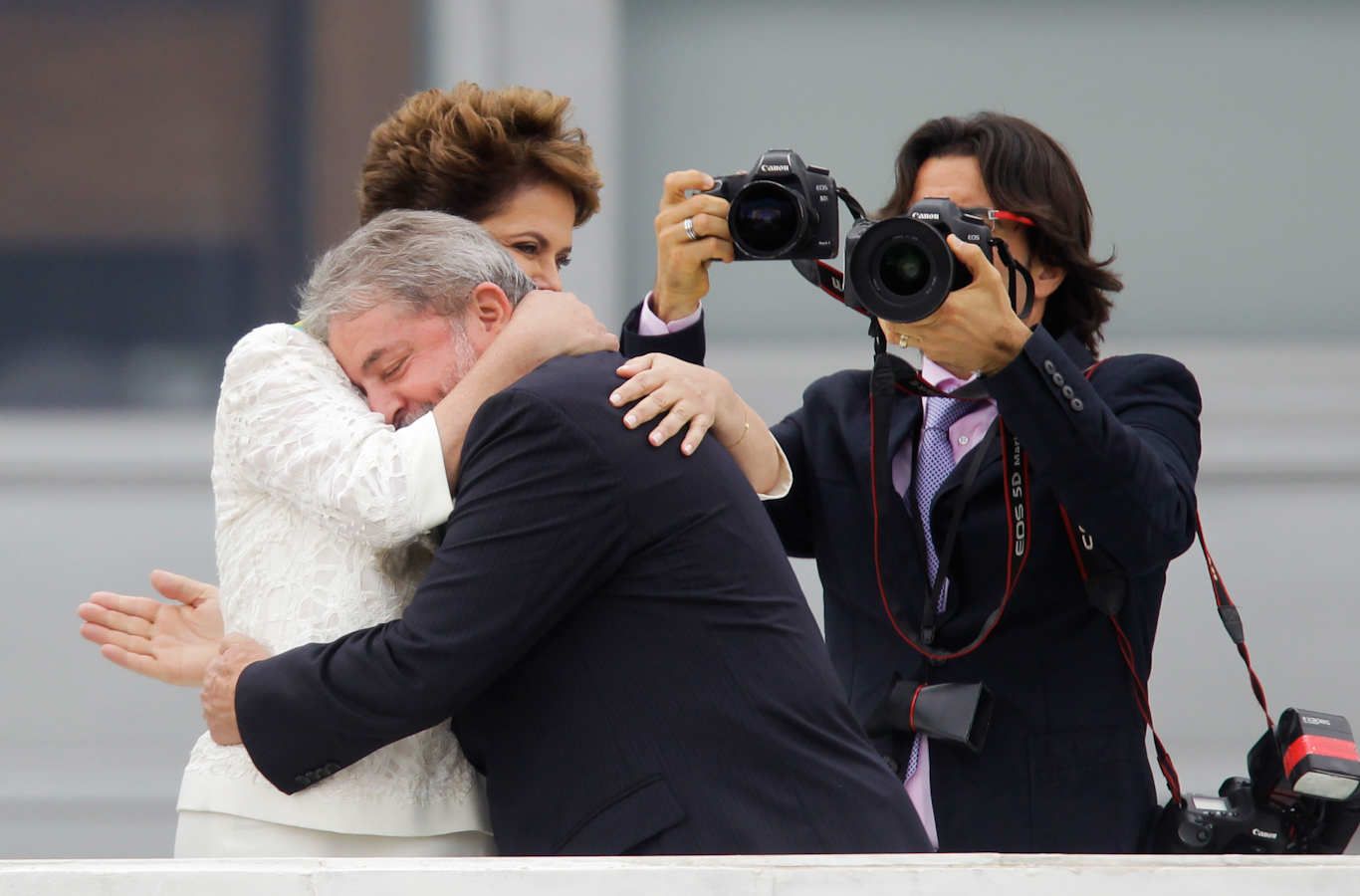
Lula da Silva, right, Dilma Rousseff at her inauguration in Brasilia, Brazil, Jan. 1, 2011. Silvia Izquierdo | AP
Riding on the experience of his background to the pomp of the Planalto Palace, the president’s official workplace, Lula began implementing policies geared toward the masses. Social programs established during his two presidential terms (2003 – 2011) ended historical poverty for millions. The country was taken off the UN World Hunger Map. Bolsa Familia (Family Grant), started just two years into his presidency, provided monthly allowances to guarantee basic needs of impoverished families, such as food, hygiene and transportation. Tack on his presidential successor, Dilma Rousseff, also a Workers’ Party (PT) member, and Brazil’s government, over thirteen-and-a-half years, built 422 technical schools, 18 public universities, and 173 new university campuses — more educational institutions than built in the country’s history.
“Humanity must understand that the only just war is the war against inequality,” Lula said while speaking in Mexico’s House of Representatives earlier this month. “However, some people in positions of power do everything to produce even more inequality and more suffering.” In the shadow of the past three-and-a-half years — marked by a Brazilian judicial system and presidency that reversed social and political gains during Lula’s two terms in office, as well as during the term of his successor, Dilma Rousseff — a resurgence of the South American giant, internally and internationally, hangs in the balance of the October 2022 general elections. If re-elected for a third term in office, Lula has vowed to resume where he left off — a “peaceful revolution,” as he puts it:
We [will] combine development with social inclusion, economic stability, total respect for the rule of law, human rights and individual and collective freedoms. We [will] govern for everyone, implementing public policies aimed, particularly, for the poorest.”
Feature photo | A giant cutout of Brazil’s former President Luiz Inacio Lula da Silva depicted wearing a protective face mask, towers over demonstrators during a protest against Brazilian President Jair Bolsonaro, calling for his impeachment over his government’s handling of the pandemic and accusations of corruption in the purchases of COVID-19 vaccines, in Rio de Janeiro, Brazil, Oct. 2, 2021. Bruna Prado | AP
Julian Cola is a translator (Brazilian-Portuguese to English). A former staff writer at the pan-Latin American news outlet, teleSUR, his articles and essays also appear in Africa is a Country, Black Agenda Report, Truthout, Counterpunch and elsewhere.
The post Lula Counters FBI-Backed “Corruption” Prosecution to Lead Brazil’s 2022 Presidential Race appeared first on MintPress News.
